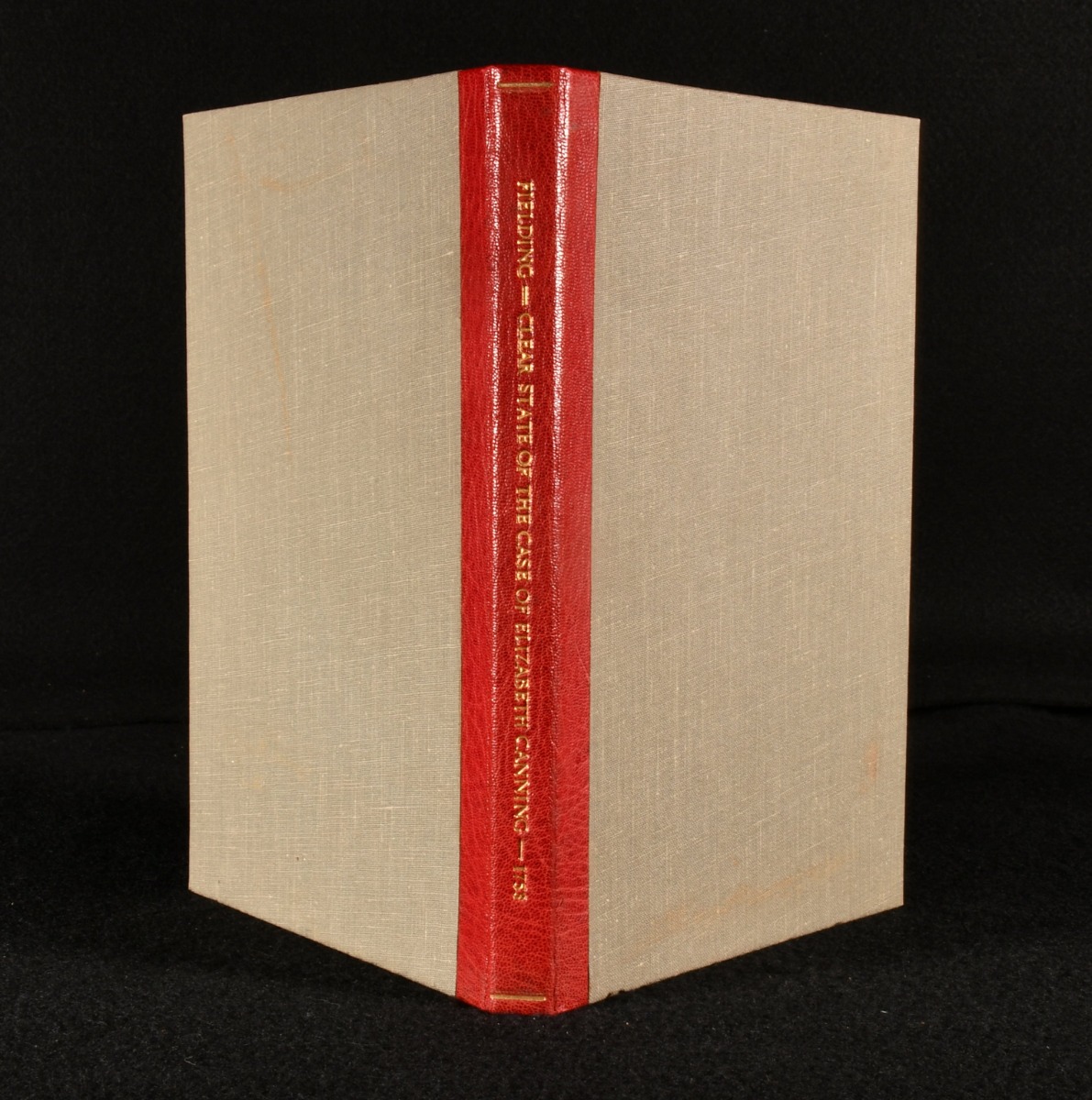Available Copies from Independent Booksellers

FIELDING, Henry. A Clear State of the Case of Elizabeth Canning , etc. A.Millar, London, 1753.
Price: US$96.62 + shipping
Condition: Good
Description: pp [title] + 62 Sound subject to chip in last leaf (not affecting text) , evidence of having been bound with other material. Size: 12mo - over 6¾" - 7¾" tall
Seller: LONGLAND BOOKS, Totteridge, LDN, United Kingdom

Price: US$502.42 + shipping
Description: A scarce account demonstrating Henry Fielding's humanitarian commitment to justice. Regarding the case of Elizabeth Canning, this pamphlet is one of Fielding's final works. Disbound, as issued. Held in a custom clamshell box.The Elizabeth Canning trial was one of the most notorious criminal mysteries in 18th century Law. This pamphlet is an early publication in support of Elizabeth Canning's account.ESTC reference no T89860.Elizabeth Canning disappeared from her mother's home in 1753. She appeared weak and starved following her reappearance a month later. Her account of what happened became a popular topic for coffee-house pamphlets, with over forty pamphlets issued in 1753-1754. Canning stated she was robbed on her way home from a relative's, and taken forcibly to a house in Enfield Wash. It was there she was robbed of her clothes and held captive in an unheated room for a month. She escaped through a window and walked to her mother's house.This work was published in the final years of Fielding's life when there had been a considerable deterioration in his health. The case of Elizabeth Canning piqued Fielding's interest due to his experience in criminology and his story 'Amelia' which shared parallels. Fielding was responsible for taking Canning's sworn testimony and he was impressed with her modesty and genteel manner. He then issued a warrant for the detention of her alleged captors Wells and Squires. They were found guilty at trial, although the Chief Magistrate of London was dissatisfied and re-opened the case, resulting in Canning's conviction for perjury. This work is written in defence of Elizabeth Canning and resulted in replies from his enemies.A central publication to this important trial. Disbound, as issued. Externally, very bright. Small spot to the title page. Internally, firmly bound. Pages are bright with just the odd spot. Very Good Indeed
Seller: Rooke Books PBFA, Bath, United Kingdom

Price: US$611.92 + shipping
Condition: Good
Description: A scarce account demonstrating Henry Fielding's humanitarian commitment to justice. Regarding the case of Elizabeth Canning, this pamphlet is one of Fielding's final works. Disbound, and held in a custom clamshell box.The Elizabeth Canning trial was one of the most notorious criminal mysteries in 18th century Law. This pamphlet is an early publication in support of Elizabeth Canning's account.ESTC reference no T89826. This issue with 'to require' at the start of line 3 to page 4.Elizabeth Canning disappeared from her mother's home in 1753. She appeared weak and starved following her reappearance a month later. Her account of what happened became a popular topic for coffee-house pamphlets, with over forty pamphlets issued in 1753-1754. Canning stated she was robbed on her way home from a relative's, and taken forcibly to a house in Enfield Wash. It was there she was robbed of her clothes and held captive in an unheated room for a month. She escaped through a window and walked to her mother's house.This work was published in the final years of Fielding's life when there had been a considerable deterioration in his health. The case of Elizabeth Canning piqued Fielding's interest due to his experience in criminology and his story 'Amelia' which shared parallels. Fielding was responsible for taking Canning's sworn testimony and he was impressed with her modesty and genteel manner. He then issued a warrant for the detention of her alleged captors Wells and Squires. They were found guilty at trial, although the Chief Magistrate of London was dissatisfied and re-opened the case, resulting in Canning's conviction for perjury. This work is written in defence of Elizabeth Canning and resulted in replies from his enemies.A central publication to this important trial. Unbound, as issued. Externally, generally smart. Browning to the front and rear wrap. Tear to the margin of the title page, resulting in the title page loosening slightly. Closed tear to the centre of gutter to B1-4. Tape repair to the verso of title page. Occasional scattered spots to pages. Final leaf is detached but present. Good
Seller: Rooke Books PBFA, Bath, United Kingdom